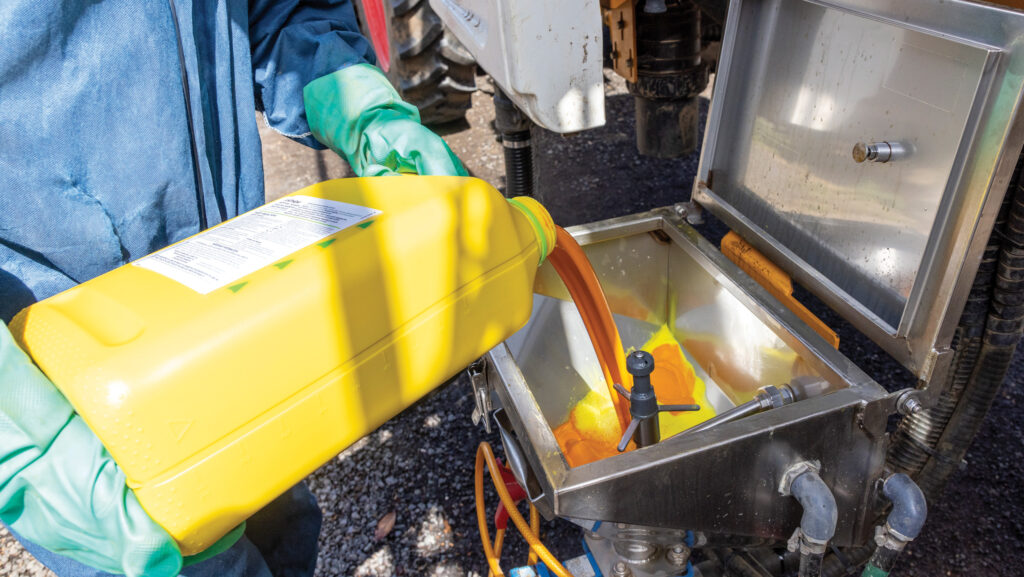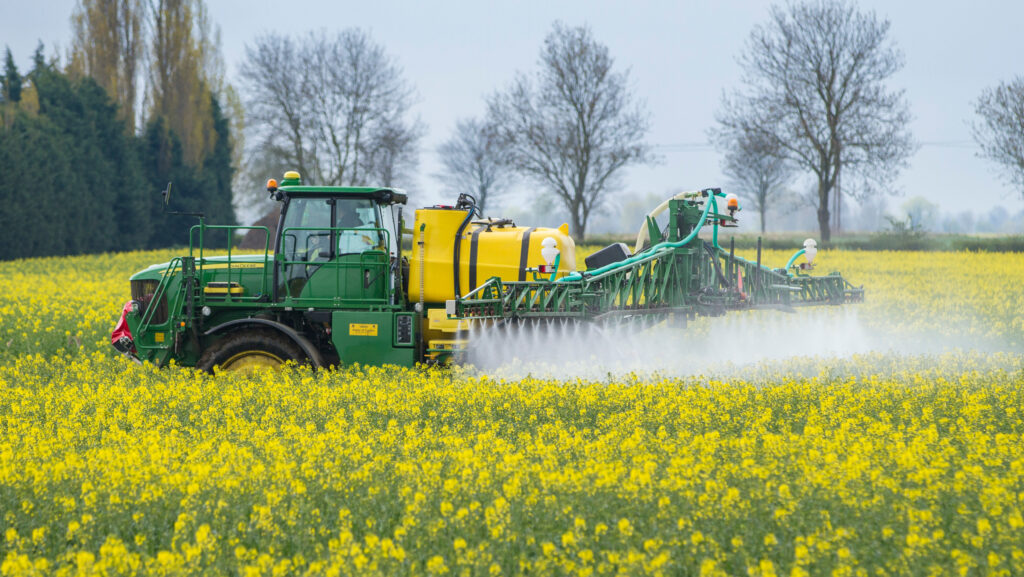Analysis: How to protect yourself from fake seeds and pesticides
 © GNP
© GNP Digital analysts, on-ground track-and-trace teams and forensic testing might sound like something from a TV crime show, but some of the world’s biggest agchem manufacturers are having to turn detective to tackle a costly problem.
The global trade in illicit seeds and plant protection products (PPPs) causes at least $6bn (£4.6bn) in losses to the agricultural sector each year.
According to the Transnational Alliance to Combat Illicit Trade (Tracit), 25% of global pesticides are counterfeit, while a 2018 survey by the International Seeds Federation found that in some countries as much as half of all seeds sold to farmers are fake.
See also: How microbial seed dressing helps cut nitrogen fertiliser
The implications for growers and those working on farms are significant.
“Illegal alternatives put farmers at risk of financial loss, legal consequences, environmental harm and reputational damage,” says Josh Woolliscroft, head of external affairs at CropLife UK, the body representing the UK’s plant science industry.
Legitimate PPPs are rigorously checked and tested to make sure they are safe for crops and for those spraying, while illicit products can contain unknown or unsafe ingredients that can lead to crop failure, rejected produce, and even prosecution, he adds.
And the impact of counterfeit products can extend beyond individual farms, disrupting supply chains, increasing market volatility, driving up costs for farmers and consumers, and threatening food security.
In Sub-Saharan Africa, the World Bank estimates that counterfeit seeds are responsible for rice yields averaging less than one-third of their potential.

© GNP
Global efforts
The costly impact of counterfeit seeds and PPPs has prompted tough reactions from authorities and organisations around the world.
The European Anti-Fraud Office says illicit pesticides are one of the most profitable sectors for fraudsters, estimating that almost 14% of all pesticides in the EU are fake.
In response, the EU launched Operation Silver Axe, an annual operation co-ordinated by Europol, the EU’s law enforcement agency, to investigate criminal activities across the continent.
In 2020, it confiscated more than 1,300t of illicit pesticides, while in previous years hundreds of tonnes of fake PPPs were intercepted before they could reach farms.
But it’s not just anti-crime organisations which are taking a stand; individual businesses are also taking measures into their own hands.
Syngenta has its own dedicated anti-counterfeiting team that works with Europol, Interpol and local police authorities to track down illegal vendors and manufacturers, and gather the detailed evidence needed to prosecute them.
“When you look at the $6bn cost of illicit trade, if it was one company it would be the fourth-largest company in the agricultural industry,” says Laurent Giezendanner, Syngenta’s head of corporate security.
The size of the market for illicit PPPs and seeds is so large because criminals see them as a lower-risk alternative to counterfeiting pharmaceuticals, which could come with heavy repercussions if something goes wrong, he explains.
“Messing up with seeds [is less likely to result in a prison sentence] than if they mess up with pharmaceuticals. And so fake tomato seeds, or some of our complex chemicals, are copied like Gucci handbags,” says Mr Giezendanner.
How farmers can protect themselves against illicit products
- Buy from trusted suppliers Stick to known distributors and manufacturers, and avoid deals from unfamiliar traders or online sources.
- Check packaging and labels Make sure labels are in English, professionally printed, and include details such as the manufacturer’s name and official registration number. Be wary of tampered packaging.
- Verify before use Cross-check the product name, active ingredient, and batch number with official records. Farmers can verify product authorisation through the Health and Safety Executive database.
- Report anything suspicious If a product seems unusual or counterfeit, report it to Defra or local Trading Standards immediately. Industry organisations such as the AIC and the NFU can also provide guidance and support. Retaining evidence, such as receipts and packaging, is crucial for investigations.
Moving online
For Mr Giezendanner’s team, much of the current focus is on identifying illicit sales online, where volumes of fake products have ramped up significantly in recent years.
“Since Covid, organised crime and cyber criminals have seen an opportunity to get more clients online, and we have seen a monumental increase in illicit online offers,” he says.
In response, the company has deployed artificial intelligence web-scraping technology to monitor online marketplaces across 40 countries, taking down 10,000 illicit advertisements and shutting down 300 fraudulent websites in the past year alone.
Tracit is a global alliance of companies including Syngenta and CropLife International, as well as the likes of Chanel and Heineken.
Jeff Hardy, its director-general, says the growth in online sales of counterfeit products is something governments around the world need to take more seriously.
“The world was woefully unprepared for a future to be dominated by online shopping, where there is very little control and shoppers are at risk,” he says.
“No one would ever have thought there’d be a global market for pesticides online, but not only are these products available on rogue websites, they’re also popping up on major e-commerce platforms.
“Governments need to address this right away. You need licences or permits to buy and use pesticides, so to what extent are these platforms ensuring that sellers are licensed and products are going to countries where they’re permitted to be used?”
The UK – better track record, but still at risk
While the size of the global problem is undoubtedly concerning, in the UK the issue is thankfully on a much smaller scale.
The Agricultural Industries Confederation (AIC) estimates that only 1-2% of PPPs in the UK are illicit.
However, that low number doesn’t mean farmers and agronomists shouldn’t be aware of the potential risk, says Hazel Doonan, the organisation’s head of crop protection and agronomy.
“The UK is a smaller market, so it’s often not worth the criminals’ efforts and costs to get illicit product across from mainland Europe, where they can move product across borders more easily,” she explains.
“But there are some sectors that use high-value and high-volume product that criminals will want to target, so it is important to be vigilant.”
Caution
Ms Doonan says farmers should be cautious of unfamiliar suppliers, especially ones they see online, and warns that counterfeiters sometimes price their product at normal market rates to avoid suspicion.
“Ask yourself, are the packaging and labels what you would expect.
If the packaging and labels are really good, you might only find out it was counterfeit after you apply the product and you get crop damage, or it simply doesn’t work,” she explains.
“By then, the damage is done. You don’t know what you’ve put on your crop, and it might not be what it says on the label.
“As parallel products can be used as a route for counterfeits to enter the market, if you’re offered a parallel product, it’s important to check its provenance, to understand where it’s come from and what it’s been paralleled against,” she adds.
“And if you’re approached by a supplier you’re unfamiliar with who isn’t your regular distributor, contact your agronomist to understand what’s happening in the marketplace.”
Vigilance
Dr Neal Evans, of the Voluntary Initiative, an industry-led programme promoting responsible PPP use, says while crop products are highly regulated in the UK, illicit trade may still exist, making it important that farmers remain vigilant.
Last year the Voluntary Initiative, supported by the NFU, Red Tractor and CropLife UK, relaunched its Watch Out! campaign to provide farmers and agronomists with tips to identify and avoid counterfeit PPPs, such as buying through a reputable dealer, questioning unrealistic prices, and checking packaging (see “How farmers can protect themselves against illicit products”).
“Legitimate product generally carries a copy of the Voluntary Initiative logo on the can, and farmers can make sure it fully checks out in terms of the wording on the can and data sheet,” Dr Evans says.
“That’s often the big giveaway, as a lot of the illegal product doesn’t match the Mapp [Ministerially Approved Pesticide Product] number that’s held with the Health and Safety Executive’s database.”
Contact
If a grower thinks illicit product might have found its way onto their farm, they should contact Defra or Trading Standards immediately, as well as approach industry organisations such as the AIC, Dr Evans adds.
For Ms Doonan, sourcing the best quality advice and PPP remains paramount for any grower, especially as farm finances are being stretched.
“It’s important that growers have the issue of counterfeit PPPs in the back of their minds, particularly at the start of the season when two-thirds of pesticide use occurs,” she says.
“It would be very foolhardy to risk their business and reputation for the sake of saving 10% on PPPs that might turn out to be illicit.”
